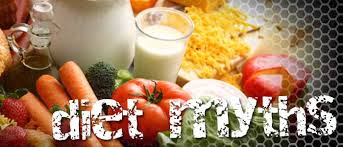Crash diets. We’ve all tried it at least once in our lives, even more for some. These diets can help us lose pounds in a few days. Crash diets are called crash diets for a reason, like a car crash these types of diets happen fast and have a tragic effect on the body. Crash diets require minimal calorie and food intake causing different health risk, especially in the heart, brain, and digestive system.
There are a lot of misconceptions around diets. We have compiled a list of famous diet myths and collected scientific facts about them. We hope these help you broaden your knowledge about eating healthy, losing weight and living a healthy lifestyle.
Famous Diet Myths
1. Myth: Eating small meals throughout the day will help burn more calories and improve metabolism
Debunked: It’s often a misconception that eating small frequent meals throughout the day will help boost the metabolic rate. Studies have proven that eating 2 to 3 full meals a day has the same calories burned as 5-10 small meals a day. Small frequent meals work for some people, especially for those who struggle with excessive snacking. A new study has proven that eating too much or having frequent meals within the day on a high calorie diet can increase abdominal and liver fat.
2. Myth: Caffeine Will Boost Metabolism
Debunked: Most of the food we consume don’t directly affect our metabolic rate unless they are in excessive amount such as concentrated fat burning supplements. Caffeine can temporarily increase your metabolism but only slightly. This increase in metabolism is not enough to help you lose weight. Drinking coffee before working out can help increase calorie burn, but drinking coffee alone won’t help you shed off the pounds.
3. Myth: Skipping A Few Meals Can Help You Lose Weight
Debunked: The body needs food for energy and warmth. Eating regularly and maintaining a proper diet will keep your metabolism working. This will prevent you from feeling hungry and having unwanted cravings. Skipping or having long gaps between meals will confuse your body into thinking it is being starved. This will lower the metabolism and increase fat storage. Doing in the long run can permanently affect your metabolism and make is slow even with consistent meals.
4. Myth: Saturated Fat and Trans Fat Should Be Avoided
Debunked: Health organization categorizes trans-fat and saturated fat in the same category. They are known as unhealthy fats and should be avoided like the plague. Trans-fats are harmful to the body and can cause multiple health problems, but saturated fat is safe.
5. Myth: Eating Pasta Will Make You Fat
Debunked: When starting a low carb the diet the first thing that you tend to remove is pasta. Pasta is filled with carbs, but these carbs aren’t making you fat the excessive amount of calories you intake does. You can eat pasta as long as you watch what ingredients you add to your pasta such as the sauce and cheese. Do portion control and avoid eating pasta every day and you’ll be safe from pasta induced weight gain.
6. Myth: Eating after 6pm or 8pm will make you gain weight
Debunked: Another popular myth is the after six rule. Eating after 6pm or 8pm will make you gain weight because food is digested slower and will most likely turn into fat. The thing with calorie is they can’t distinguish time, they don’t know if it’s night or day. The body digests food at the same rate during morning, afternoon and night. This misconception comes from the idea that we burn more calories in the morning since we are more active. It’s safe to eat at night just given that you watch what you eat. Eating excessively or eating something greasy will alter your sleeping pattern and cause indigestion during sleep.
With these famous myths debunked, we hope that you now have a far better understanding about diets and healthy eating.












